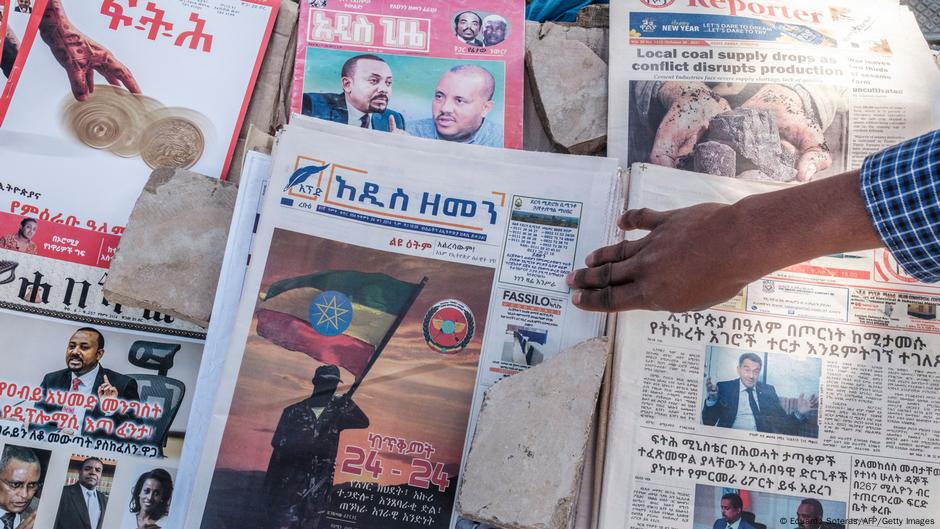has seen a surge in detentions of journalists in recent months. Now, Deutsche Welle’s Amharic service, which has been broadcasting to Ethiopia since 1965, was informed on October 23 that the Ethiopian Media Authority (EMA) had “temporarily” suspended nine DW correspondents based in the capital Addis Ababa and several regional cities. The letter from the EMA does not contain any concrete allegations, but broadly accuses DW of violating media proclamations, and disseminated unbalanced and conflict-aggravating reports that “lack reliable sources.”
In a statement, DW condemned the suspension of its staff in Ethiopia, and asked the government to “urgently make available” transcripts of reports deemed not in line with professional ethics.
DW’s Director-General Barbara Massing said: “We are very concerned about the restriction on our reporting in Ethiopia. Following the discontinuation of the language services of Voice of America, Deutsche Welle offers the most widely accessed Amharic-language program by an international media outlet in Ethiopia. Millions of Ethiopians continue to rely on us to provide them with access to independent information.”
In response to the suspension of DW’s journalists, Angela Quintal, Africa Program coordinator for the Committee to Protect Journalists, said: “This blatant suspension of Deutsche Welle’s journalists is an outrageous act of censorship and intimidation. Ethiopian authorities are weaponizing media laws to silence independent reporting and control the narrative. The government must immediately lift the suspension, stop harassing journalists, and respect the public’s right to information.”
In the past, Ethiopian authorities have repeatedly accused DW of false reporting, most notably in the wake of the deadly 2005 elections. A commission of inquiry into the allegations did not yield any proof of misreporting.
Under the Ethiopian People’s Revolutionary Democratic Front (EPRDF) government, Ethiopian authorities were accused by media watchdogs and DW of “noise jamming” the shortwave radio signal of DW Amharic.
Press freedom under pressure
Sadibou Marong from media rights watchdog Reporters Without Borders (RSF) said the situation for journalists, and civilians connected to journalists, in Ethiopia is “quite awful and problematic.”
“Arbitrarily arresting journalists and keeping them incommunicado shows how far Ethiopian authorities might go in the repression against journalists,” Marong told DW.
The CPJ’s Quintal said that “media and anti-terror laws continue to be weaponized against journalists, internet shutdowns are used to silence reporting and arbitrary arrests have become routine.”
Journalists have been accused of promoting terrorism, hate speech, disseminating false information or when reporting on conflict. In 2023, 15 foreign TV channels were suspended, according to RSF. The state has also gradually introduced fees that create barriers to broadcasting in Ethiopia.
Ethiopia is an East African giant, with a population of around 130 million people. But the country ranks 145th out of 180 countries in the Reporters Without Borders’ 2025 press freedom index, which cites “widespread self-censorship.”
The country also has a reputation for jailing journalists — according to the CPJ, Ethiopia has jailed 30 journalists since 2018. This is despite initial optimism that Prime Minister Abiy Ahmed, who came to power that year, would reform the country’s previously tightly controlled media landscape.
The government made it easier to acquire broadcasting licenses, decriminalized defamation and put in place measures to protect journalistic sources. It also allowed greater freedom and say for privately-owned media leaders.
But even then, Ethiopian authorities were accused of circumventing freedom of speech laws, especially when civil war between government and
An amendment to the nation’s 2021 media law in April 2025 triggered more criticism from rights groups. The change increases government control over the regulatory Ethiopian Media Authority (EMA), which issues sanctions against news outlets that violate press ethics, including revoking their licenses.
Media personalities abroad also targeted
In mid-August, the Ethiopia Observer reported that an Ethiopian delegation to France, which included Prime Minster Abiy Ahmed, , asked France to assist in the “extradition” of two Ethiopian journalists based there who were accused of being critical of the government.
The CPJ’s Quintal told DW that Abebe Bayu and Yayesew Shimelis were “subjected to repeated detention in Ethiopia before their exile.”
“Such transnational repression highlights the government’s overreach beyond its borders to muzzle dissenting voices, in direct contravention of Ethiopia’s obligations under international human rights law,” she added.
There have been reports of similar efforts targeting critical voices in other European Union countries, but also South Africa, Kenya and Uganda.
“In safer countries, they have the possibility to reinvent themselves. The Ethiopian diaspora constitutes a very big group, and that group most of the time sticks to their independence, they stick to their freedoms. And there is a possibility they might influence Ethiopians from abroad,” said Marong, explaining how authorities have justified efforts to track Ethiopian media professionals in other countries.
“This is something we have seen recently, and it’s an extraordinarily bad trend,” he added.
2026 election adds to press freedom concerns
Ethiopia is also heading toward a general election, set for June 2026. Watchdogs fear that any gains in will be reversed as Addis Ababa seeks to control the narrative.
“Dissenting voices are still tracked, and surveillance is also carried out on journalists entering Ethiopia. That trend will not be stopped,” said Marong. “There is a general move of controlling the narrative, trying to occupy the civic and the public media space with their own narrative.”
This is an updated version of an earlier article published on 09/01/2025
The post Ethiopia suspends DW correspondents as it tightens grip on media ahead of 2026 vote appeared first on Deutsche Welle.




